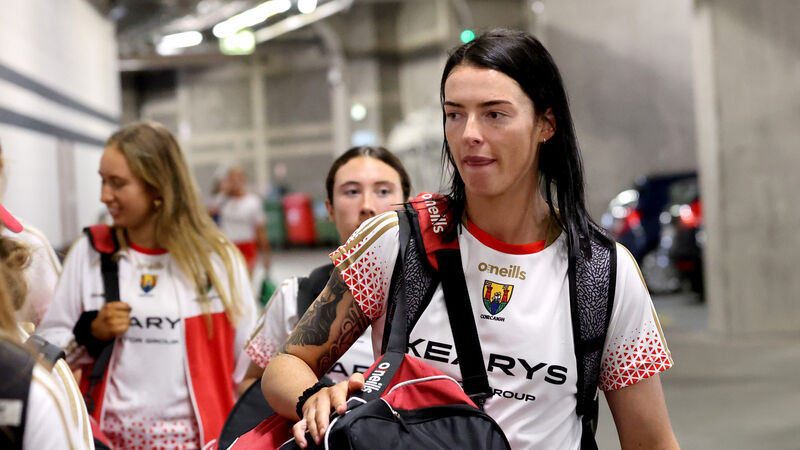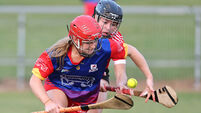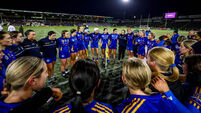Christy O'Connor: All-Star disaster showed a lack of respect for camogie's top players

Cork talisman Ashling Thompson refused to get on board with an All-Star trip in the month before inter-county championship. Picture: INPHO/James Crombie
A FEW years back OTBSports.com ran a two-part series over two weekends where 13 Irish female athletes from across a range of sporting backgrounds spoke to Arthur James O'Dea about the challenges that women routinely face in their sport.
Despite inequality and unfairness having far fewer places to hide in Irish sport than in the past, the 13 female athletes still gave a fascinating range of insights into the struggles they are continually faced with.
One of the most revealing comments came from Ailish Considine, the Clare ladies footballer who, last year, became the first Irish player to win two AFLW Premiership titles in Australia.
“Women didn’t put themselves in the corner and say, ‘We’re second-class citizens, forget about us,’” said Considine. “No woman said that. But I’m quite used to feeling like a second-class citizen with the GAA.
“It is constant the battle for equality and that bothers me deeply. Women have fought for years and in this day and age there’s just no excuse for us to be treated differently. But look, it feels like all we’re doing is fighting and looking for something. It can be so tiring.”
Despite all the issues that women have continually had to fight against in sport, and in society, ranging from sexism, inequality, wages, prize money, the most hurtful is often a lack of respect and appreciation.
Yet it is surely much more painful again when a perceived lack of empathy or consideration comes from their own organisation.
When it was recently announced that the 2023 Camogie All-Star tour will take place in Canada from May 19-25, the seven Cork players who won All-Stars in the past two seasons decided to boycott the tour because of its scheduling just one week out from the start of the All-Ireland championship.
The draws have yet to be made, but the first round of senior group games are down for decision on the weekend of June 3-4.
Although it is unconnected to the All-Ireland championship, the Munster senior camogie final is scheduled for the weekend of May 20-21, which is right in the middle of the All-Star tour. In any case, the players who return from Canada will have less than one week to prepare for their opening game in early June.
The split season has influenced their decision to schedule the trip so close to championship, especially when the Camogie Association are trying to fit in a national league, provincial championship and All-Ireland series before the club season kicks off.
There was talk of the start date of the All-Ireland championship being potentially pushed out to the weekend of June 10-11. However, Aisling Thompson was adamant that any tweaks made to the championship dates will make no difference to Cork – they are not prepared to travel in the middle of the inter-county season.
Whatever way the Camogie Association dress up the tight timeframe around the organisation of the trip, it smacked of a lack of respect for its players.
What was the point of organising the trip so close to the championship in the first place? How could players even enjoy it? How comfortable would the players not selected for the trip feel towards their team-mates going on a holiday so close to the championship? Was it all just an exercise in box-ticking by the Camogie Association?
The seven Cork players who have pulled out of the tour deserve huge respect. They didn’t need to be as militant or organised as their male predecessors who were fighting for better rights in the 2000s.
But similar to those striking Cork hurlers and footballers, their withdrawal has put increased pressure on the Camogie Association to act. It may only be a subtle intervention by the players but it is a still a wider gesture towards greater player welfare in female GAA.
Thompson also touched on a critical point in this latest debate. “We are looking to be the one association,” she said. “That's the goal.
"How can you possibly look for equality when women don't support women? The GAA wouldn't make decisions like this and put players in such an awkward situation."

The ultimate goal towards amalgamation between the GAA, the LGFA and Camogie Association has been in the works now for over 10 years. The GAA’s hierarchy privately knows this is the only way forward — ethically, politically, practically and financially. Having merged with the Women’s GPA in late 2020, the GPA clearly wants it. So why the continued delay?
Camogie has always appeared more willing to make the leap, compared to the LGFA. The sharp rise in popularity and marketability over the last few years has always made amalgamation a harder sell. The LGFA have always been cautious about the potential to get swallowed up by the GAA and be forgotten.
The GAA could possibly do more to ease those concerns, especially on voting rights on the GAA’s management committee. A multitude of issues going back over the last decade, ranging from rules, membership, staffing, along with media and commercial rights have remained sticking points for the LGFA in that goal towards all operating under one umbrella.
In the meantime, all three associations need to figure what they truly want if they are to operate together. And if they eventually can, there should be far fewer PR fiascos than what transpired last week.
And far more respect shown towards female GAA players.










 App?
App?







